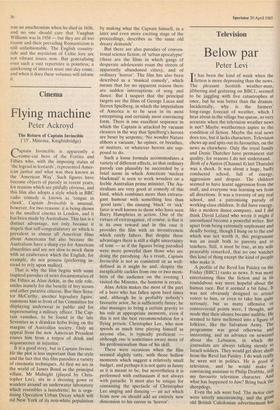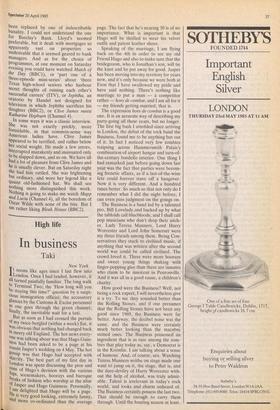Television
Below par
Peter Levi
It has been the kind of week when the fiction is more depressing than the news. The pleasant Scottish weather-man, jibbering and gesturing on BBC1, seemed to be juggling with five catastrophes at once, but he was better than the dramas. Incidentally, why is the farmers' long-range forecast of weather, which I hear about in the village bus queue, so very accurate when the television weather news is not? Maybe weathermen aspire to the condition of fiction. Maybe the real news does too, but it lacks characters. Television chews up and spits out its favourites, on the news as elsewhere. Only the royal family and Denis Thatcher have permanent star quality, for reasons I do not understand. Birth of a Nation (Channel 4) last Thursday was a shock. It was about a huge, badly conducted school, full of energy, aggression and despair. The children seemed to have learnt aggression from the staff, and everyone was learning sex from all directions. It was a travesty of any real school, and a patronising parody of working-class children. It did have energy, like a modern dance, company, and I did think David Leland who wrote it might if unconfused become a powerful writer. But apart from being extremely unpleasant and deadly boring, though I hung on to the end which was not worth it, this programme was an insult both to parents and to teachers. Still, it must be true, as my wife peaceably remarked, that no one watches this 'kind of thing except the kind of people who make it.
A profile of the Revd Ian Paisley on the Friday (BBC1) ranks as news. It was more entertaining than the fiction and in its roundabout way more hopeful about the human race. But it seemed a bit false. It was not obviously designed to attract voters to him, or even to take him quite seriously, but so many offensive or controversial points were, I thought, not made that their silence became audible. He seemed to have mellowed into a figure of folklore, like the Salvation Army. The programme was good otherwise and interesting, and an advance on newsreel about the Lebanon, in which the journalists are always talking sternly to Israeli soldiers. They would get short shrift from the Revd Ian Paisley. I do wish really he were not in politics. He is good at television, and he would make a convincing assistant to Philip Drabble, still my favourite television character. And what has happened to him? Bring back the sheepdogs.
Even the ads were bad. The motor cars were utterly unconvincing, and the good old British Caledonian advertisement has been replaced by one of indescribable banality. I could not understand the one for Barclay's Bank. Lloyd's seemed preferable, but it dealt with mortgages so apparently vast on properties so undesirable that it seemed geared to bank managers. And as for the choice of programmes, at one moment on Saturday evening you could have watched Match of the Day (BBC1), or 'part one of a three-episode mini-series' about 'three Texas high-school seniors who harbour secret thoughts of ruining each other's successful careers' (ITV), or Jephtha, an oratorio by Handel not designed for television in which Jephtha sacrifices his daughter (BBC2), or Clive James meets Katharine Hepburn (Channel 4). In some ways it was a classic interview. She was not exactly prickly, more formidable, in that common-sense way American ladies have. Clive James appeared to be terrified, and rather below her social weight. He made a few errors, interrupted mistakenly and insinuated only to be slapped down, and so on. We have 'all had a lot of pleasure from Clive James and he is usually clever. But on Saturday night she had him rattled. She was frightening but ordinary, and wore her legend like a quaint old-fashioned hat. We shall see nothing more distinguished this week. Nothing is going to make me watch Mapp and Lucia (Channel 4), all the boredom of Oscar Wilde with none of the bite. But I am rather liking Bleak House (BBC2).















































 Previous page
Previous page